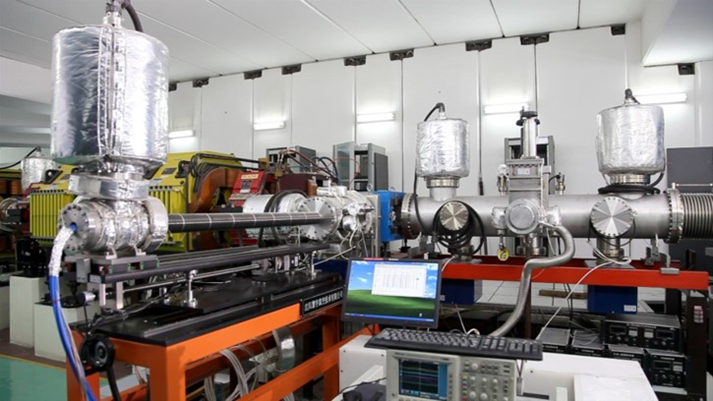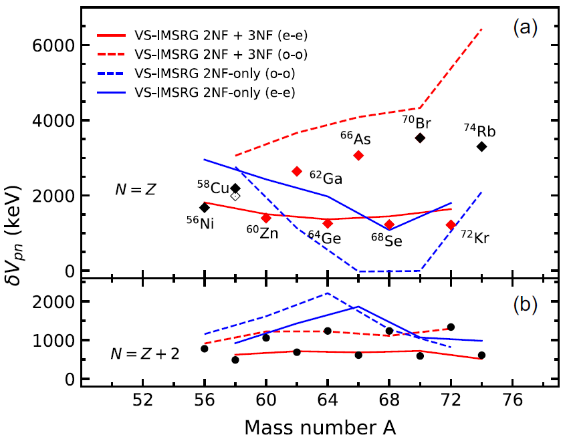Precision Mass Measurements Reveal Importance of Three-Nucleon Force in Modeling Atomic Nuclei
Researchers at the Institute of Modern Physics (IMP), Chinese Academy of Sciences (CAS) and their collaborators have accurately measured masses of a series of nuclei. Using the new mass data, they investigated the proton-neutron interactions in the nuclei and discovered the bifurcation of the interaction, revealing the impact of three-nucleon force on modeling self-conjugate nuclei. The results were published in Physical Review Letters.
Nuclei with the same number of protons and neutrons are called self-conjugate nuclei. Proton-neutron (pn) interactions are significantly larger in self-conjugate nuclei than their neighboring nuclei. As mass number increases, the pn interactions will gradually decrease. It has been observed that the pn interactions in self-conjugate odd-odd nuclei would increase when the proton number is larger than 28, which is consistent with theoretical predictions. Nevertheless, experimental data were lacking for the even-even nuclei before the current work.
The experiment was conducted at the Heavy Ion Research Facility in Lanzhou (HIRFL). Using the newly developed spectrometry, the research team measured the masses of germanium-62, arsenic-64, selenium-66, and Krypton-70 for the first time, and improved the mass precision of seven other nuclei.
Based on the new mass data, the researchers extracted the pn interactions for even-even nuclei. Surprisingly, they found that the trend is opposite to that of odd-odd nuclei. This bifurcation of pn interactions in self-conjugate nuclei can not be reproduced by any existing nuclear mass models.
To understand this intriguing phenomenon, the researchers performed the ab initio calculations and found that the phenomenon could not be reproduced if only two-nucleon interactions were considered. After introducing the three-nucleon forces, the theory can well describe the bifurcation phenomenon of pn interactions in conjugated nuclei. Further investigation shows that the three-nucleon force have a significant influence on the pn pairing interaction in nuclei.
The study was conducted in collaboration with the Advanced Energy Science and Technology Guangdong Laboratory, Peking University, Lanzhou University, East China University of Technology, and researchers from Germany and the US.
This work was supported by the National Key R&D Program of China, the Strategic Priority Research Program of CAS, the CAS Project for Young Scientists in Basic Research, and the National Natural Science Foundation of China.
DOI:https://doi.org/10.1103/PhysRevLett.130.192501

Figure 1. The detector system of nuclear mass spectrometer based on the Cooling Storage Ring (CSR) in Lanzhou. (Image by IMP)

Figure 2. Experimental and ab initio calculations of proton-neutron interactions. (Image from Physical Review Letters)
Contact Information
Institute of Modern Physics
Email: fangliu@impcas.ac.cn



 甘公网安备 62010202000713号
甘公网安备 62010202000713号


